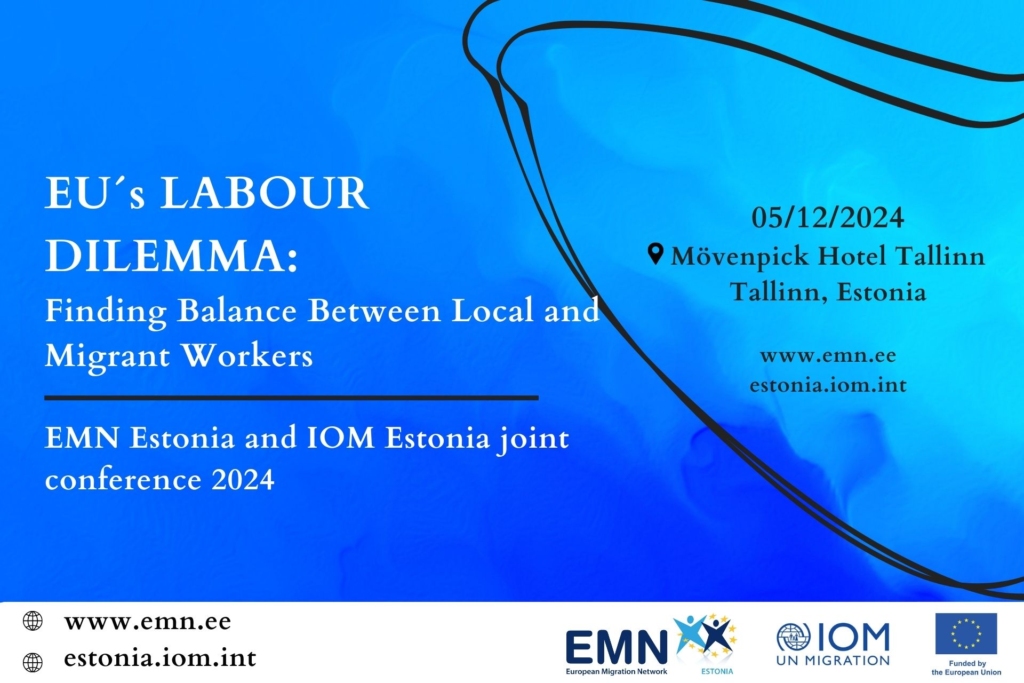9.00 – 9.30
Registration and morning coffee
9.30 – 10.00 Opening of the conference and welcoming remarks
- Barbara Orloff – Coordinator, EMN Estonia
- Kari Käsper – Head of Office, IOM Estonia
- Joosep Kaasik – Deputy secretary general for Internal Security, Ministry of the Interior (video)
- Hando Sutter – Managing Director, Estonian Employers´ Confederation
10.00 – 12.00 Understanding current labour market situation
First part of the conference will provide a global perspective on labour market movements, narrowing down to ongoing labour shortages within the EU and open the concept of EU´s labour dilemma on how to balance domestic workforce while remaining attractive in the global talent race. The panel will also explore how Ukrainian refugees have contributed to alleviating labour shortages, with a focus on the recognition of their qualifications and opportunities for upskilling.
- Opening speech by International Organization for Migration (IOM), Elizabeth Warn – Head of Labour Mobility Division, IOM
- Opening speech by European Commission (COM), Clemence Ghighi – Head of sector Talent Pathways, Legal pathways and integration unit, DG HOME
- European Policy Centre, Anastasia Karatzas – Policy Analyst in the European Migration and Diversity Programme
- OSKA: Estonian labour and skills forecasting system, Silja Lassur – OSKA Research Manager
12.00 – 13.10 Lunch
13.10 – 14.20 National strategies and effective labour policies
Second part examines how different EU Member States are addressing labour market shortages through foreign labour policies and national strategies. It will also explore approaches to maximizing the potential of talent already within the country, such as strategies for talent retention and creating pathways for foreign students, interns and others to stay and engage in the labour market.
- New and Innovative ways to attract foreign talents into EU – EMN Inform, Nicoletta Enria – Senior Consultant in Public Policy at ICF
- Czech Republic, point system pilot, shift from being a transition country to destination country, Petra Silovská – Head of the Foreign Employment Department, Ministry of Labor and Social Affairs
- Ireland, shortage occupation lists/critical skills occupation lists, Fatima Aydin – Senior Manager, Fragomen
14.20 – 14.40 Coffee break
14.40 – 15.50 Meeting labour market needs via targeted mobility schemes with third countries
Third part will delve into talent partnerships launched by the Commission as well as targeted skills and talent mobility schemes/partnerships that EU Member States have implemented in collaboration with third countries. Case studies will highlight both the key elements of success as well as challenges and the selection process of third countries for targeted partnerships. Through examples, the panel aims to provide an understanding of the complexities and opportunities that come with labour mobility agreements for both the receiving and sending countries and how to ensure the benefits of mobility for all parties.
- Italian legal framework and recent initiatives on labour mobility from Third Countries, Dr. Elisa Filippetti – Ministry of Labour and Social Policies of Italy (online)
- Finnish Talent Boost Programme and Third-Country Partnerships, Katri Niskanen – Team Leader of Labour Migration and Integration Unit, Ministry of Economic Affairs and Employment of Finland
- Meeting labour market needs via targeted mobility schemes with third countries, Marianne Vantini – Head of the Division for student immigration and regulated professions, Directorate general for foreign nationals in France, Ministry of the Interior of France
15.50 – 16.40 Moderated discussion on labour migration dilemma in Estonia: Finding Balance between Local and Migrant Workers
Participants: Killu Vantsi (Ministry of the Interior), Ulla Saar (Ministry of Economic Affairs and Communications), Berk Erdem (ESTDEV), Jaan-Hendrik Toomel (Estonian Trade Union Confederation) and Merilin Ednasevski (ABB).
Discussion is held in Estonian, translation is provided.
16.40 – 16.50 Closing remarks
